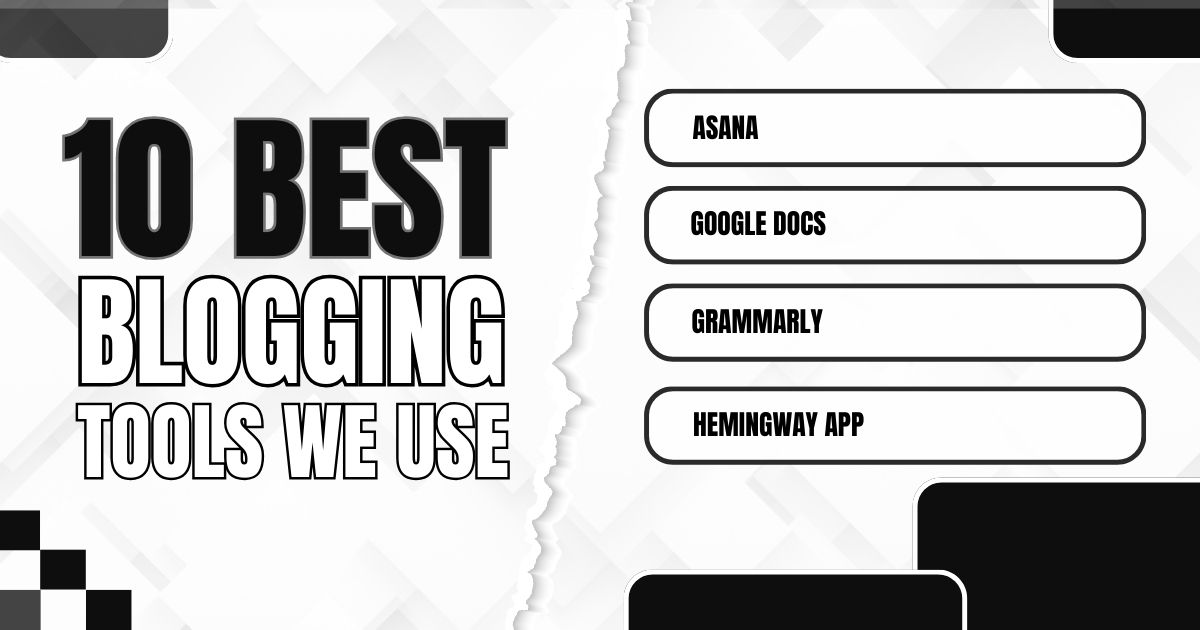Blogging platforms provide a simple way for individuals to share their ideas with the world, connect with like-minded people, and encourage open discussions. They are also valuable for marketing and branding, as successful blogs can attract a wide audience and create a loyal community.
We introduce the top blogging platforms available today. Choose the best option that suits your needs and budget.
10 Best Blogging Tools We Use
Here are some tools that help make blogging easier and more efficient:

1. Asana
Asana is a project management tool that helps organize tasks. I love using it, and HubSpot does too. It lets writers see their assigned blog posts, with detailed instructions and files attached.
Key Features of Asana:
- Organizes blog tasks and workflow.
- Add tags to find content easily.
- Attach files to specific tasks.
- Assign tasks to different writers.
Best for - Teams with many writers or solo bloggers who want to stay organized.
2. Google Docs
Google Docs is great for writing and collaboration. Multiple people can edit simultaneously without having to email different versions.
Key Features of Google Docs:
- Allows suggestions and comments.
- Tracks changes and shows who made them.
- Compare versions and restore older ones.
Best for - Teams with many people reviewing or editing content.
3. Grammarly
Grammarly helps you write with correct grammar and spelling. It also suggests ways to improve your writing.
Key Features of Grammarly:
- Checks spelling and grammar.
- Suggests better words and writing style.
- Finds plagiarism in your writing.
- Can be used as a Chrome extension for easy access.
Best for - Bloggers who need advanced editing tools that work with Google Docs or websites.
4. Hemingway App
The Hemingway App helps make your writing clearer and simpler. It highlights long or complicated sentences and gives your writing a readability score.
Key Features of the Hemingway App:
- Free to use.
- Highlights hard-to-read sentences.
- Gives a readability score to help match your reader’s level.
Best for - Writers who want to keep their writing simple and easy to read.
.jpg)
5. Canva
Canva helps create eye-catching images for your blog. You can use templates or create your own designs.
Key Features of Canva:
- Easy to use, no design skills needed.
- Thousands of templates and images to choose from.
- Paid versions have advanced features like AI photo editing.
Best for - Bloggers and marketing teams who need high-quality images without hiring a designer.
6. Featured
Featured connects you with experts who can contribute quotes or information to your blog.
Key Features of Featured:
- Easy way to find experts and include their insights in your content.
- Provides quotes, profiles, and images of experts.
Best for - Writers who want expert opinions and quotes for their blog posts.
7. CoSchedule’s Headline Analyzer
CoSchedule’s Headline Analyzer helps you create better headlines for your blog posts by scoring them on readability, word choice, and more.
Key Features of CoSchedule’s Headline Analyzer:
- Scores headlines based on readability and other factors.
- Helps improve blog, social media, and email headlines.
Best for - Bloggers who want to write attention-grabbing headlines.
.jpg)
8. Content Hub
Content Hub is a free blog maker that integrates with HubSpot’s tools. It helps you create search engine-friendly blogs and has built-in customer management features.
Key Features of Content Hub:
- It helps you create blogs and landing pages optimized for search engines.
- Allows A/B testing and live chat features.
Best for - New bloggers or businesses that want an all-in-one blogging platform.
9. WordPress
WordPress is a very popular and flexible blogging platform. It offers many plugins and themes for customizing your blog.
Key Features of WordPress:
- Drag-and-drop editor.
- Over 80,000 plugins and themes to customize your blog.
- Lots of tutorials to help beginners.
Best for - Bloggers who want full control of their blog’s design and features.
10. Ahrefs
Ahrefs is a powerful SEO tool that helps with keyword research, tracking rankings, and analyzing competitors. It’s great for figuring out which keywords to target for your blog posts.
Key Features of Ahrefs:
- Checks backlinks and analyzes competition.
- Helps with keyword research to target the right audience.
Best for - Bloggers who want to improve their blog’s search engine ranking and visibility.
Your Blog's Success Starts with the Right Tools
Success in blogging comes from using the best tools to streamline your work, improve quality, and increase visibility. From Asana for organizations to Ahrefs for SEO, these tools make the process easier.
A smart choice is SwissKnifeAI, an all-in-one solution that handles content optimization, SEO analysis, and scheduling in one place. As the saying goes, “Work smarter, not harder.” Why manage multiple tools when one can do it all?
Start using the right tools now, and watch your blog thrive!
FAQs
What tools for blogging can help me manage my content?
Several tools for blogging can assist with managing your content, such as Asana, Google Docs, and Grammarly. These tools help organize your workflow, edit content, and ensure smooth collaboration between writers.
What SEO tools can improve my blog's visibility?
SEO tools like Ahrefs and SEMrush are excellent for improving your blog's visibility. These tools analyze keywords, track rankings, and provide insights to help optimize your content for search engines.
How do blog commenting tools work?
Blog commenting tools, such as Disqus, allow readers to leave comments on your blog posts. These tools help increase engagement, build community, and boost interaction on your blog.
What kind of applications can improve the quality of your blog?
Applications like Grammarly, Hemingway, and Canva can improve the quality of your blog by enhancing readability, fixing grammatical errors, and creating professional images.


Leave a comment